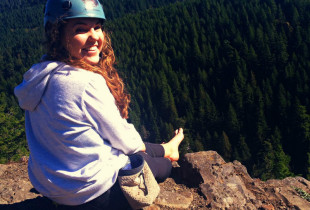By Natalie DeYoung
How often do you hear someone lament his or her lack of creativity?
“I’d love to paint/write/play music/design sweaters for small dogs, but I’m just not very creative,” they say with a hangdog expression.
As an artist, I hear it very frequently – usually after telling someone what I do. They knit their brows in wistfulness and remark, “Wow, that is so cool,” as if art is the purview of a special, anointed class of people. True, some people seem to effortlessly gravitate toward the arts and blow everyone out of the water with innovative ideas and easy facility with their chosen medium, but this does not diminish the creativity of people with less natural inclination.
Often seen as the venue of the geniuses and gifted artists, most people don’t think of themselves as particularly creative. Truthfully though, all people have some capacity for creativity – they just don’t develop it. Like a muscle, creativity in an individual grows stronger through repeated use. It builds upon previous ideas, each one sparking another like catalysts.
It must be noted first, though, that there is a vast difference between creativity and skill level. Sure, a beginning painter isn’t going to churn out a Vermeer the first go-round; all of the arts require development of a skill. Jimi Hendrix didn’t emerge from the womb with a guitar in hand, and it took Virginia Woolf decades of practice before turning out Mrs. Dalloway. You’re not going to be amazing the first time, and that’s okay.
So, if art is a matter of good old fashioned practice, then how about creativity? Picasso once remarked, “All children are artists. The problem is how to remain an artist once he grows up.”1 In other words, it would seem that creating art requires seeing ordinary objects in a new way. Children view their worlds with fresh eyes, and as such, have more room for imagination to take hold.

Of course, seeing the world in a new way can be quite a task for a jaded adult. But here is where the practice of creativity comes in:
- It is a practice, so sit down and start. Once you begin your chosen task, you start seeing the world differently because you’re actively looking at it. Sit down to write a short poem a day, and guaranteed you’re going to start developing more ideas. Remember, ideas feed off each other.
- Go for a walk outside with nothing but your own thoughts. Walking outside, away from your work or home environment, takes you away from your ordinary stimuli. It slows you down, forces you to see things in ways you wouldn’t ordinarily; butterflies, strange leaf patterns, joggers, the smell of blooming lilac. This, along with the exercise, sets your brain into mild process-and-dismiss mode, an ideal mental state for idea incubation. The repetitive movement itself can be almost hypnotizing, a perfect way to clear your mind and invite fresh insight.
- Write down your whatevers in a journal everyday. Julia Cameron, author of The Artist’s Way, recommends free writing every day to clear your mind of worries and make space for ideas to flow.
- In fact, work your way through The Artist’s Way. It will teach you to release your fears and mental blocks associated with creativity to make room for more of it in your life.
- Get out of autopilot. Take a different route to work. Mix up your workout set. Go to the grocery store on another day. You’ll be amazed at what small shifts in your routine can do to change your perspective.
- Seek out inspiration. What inspires you? A trip to the county art museum? A walk on the beach? Baking cookies? Serving at your local food bank? Whatever captures your interest, do more of it. Inspiration fuels creative fires, and in order to pour out you first must fill yourself.
- Immerse yourself. If you’re a writer of fiction, read a ton of fiction. If you’re an oil painter, research the techniques of the masters. If you’re a pianist, listen to Chopin. Learn as much as you can about your chosen art form, as it will not only give you more ideas, it will increase your knowledge so you can further develop your skills.
- Be out there. Even if you’re a homebody who prefers a Saturday on the couch, life is not happening when you’re stuck at home. Go people watching at the mall, or maybe sit in a coffee shop for an hour. You’ll gather fresh faces, funny anecdotes and novel ideas.
- But don’t forget to rest! You can’t expend the mental energy it takes to create if you’re running on three hours of sleep and caffeine fumes for too long. Cut yourself a break and make sure you take a time-out if you need it.
- Let yourself have fun. Loosen up! Creativity tends to get stifled when you take yourself too seriously.
- Above all, don’t limit yourself. This cannot be stressed enough. If you believe you will never draw, then you won’t. Creativity is about openness to all the possibilities life has to offer. You have your own unique perspective to offer the world, and utilizing your creative vision can result in a richer experience of life for both you and those with whom you share it.
Cover Photography: Shot By Tess:



